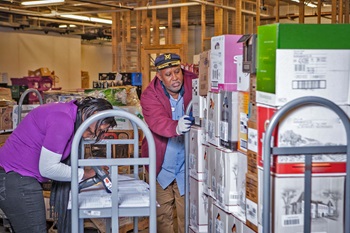By: Daniel Triot, Senior Director, FMI-GMA Trading Partner Alliance
 An estimated 15 percent of the U.S. food supply is imported, including 60 percent of fresh fruits and vegetables. According to 2016 Power of Produce, consumers continue to demand fresh produce. Additionally, there is a growing consumer desire for transparency. Shoppers want to know more information about the food and production of the food they are purchasing. For the supply chain, the pressure to meet consumer demand for high quality produce with more product information coincides with new food safety regulations. This complex situation is causing retailers and supply partners to ask, “How does the food industry create a more transparent and traceable supply chain?”
An estimated 15 percent of the U.S. food supply is imported, including 60 percent of fresh fruits and vegetables. According to 2016 Power of Produce, consumers continue to demand fresh produce. Additionally, there is a growing consumer desire for transparency. Shoppers want to know more information about the food and production of the food they are purchasing. For the supply chain, the pressure to meet consumer demand for high quality produce with more product information coincides with new food safety regulations. This complex situation is causing retailers and supply partners to ask, “How does the food industry create a more transparent and traceable supply chain?”
To increase the speed and accuracy of executing product recalls of fresh produce, the produce industry introduced a supply chain wide adoption of the Produce Traceability Initiative (PTI). PTI is an industry-wide effort to achieve electronic traceability in the supply chain through the adoption of standardized process. The Initiative establishes standardized barcoded labels that contain the Global Trade Item Number (GTIN) from the brand owner, Batch/Lot Number from the company packing the case as well as optional data such as pack/harvest date and country of origin. According to Ed Treacy, vice president, supply chain efficiencies, of the Produce Marketing Association, nearly 60 percent of all fresh produce cases are labeled with barcoded case labels adhering to the standards outlined in the PTI.
During a recall or a food safety investigation, having product traceability is critical to be able to quickly identify and remove implicated products from the supply chain. However, the benefits of traceability go beyond food safety. In more ways than one, these scannable labels are proving to create more efficiency and affordability for retailers. Today, retailers are using this information to help sales, increase freshness in their stores, enhance product rotation, better implement their Quality Assurance process, and decrease inventory mistakes with receivers.
There are a number of reasons why the demand for traceability has been on the rise including regulatory requirements like the Food Safety Modernization Act (FSMA) rule on Foreign Supplier Verification Programs (FSVP). The FSVP rule requires importers to verify that their foreign suppliers are producing food in a manner that provides the same level of public health protection as the FSMA preventive controls or produce safety regulations. However, in order to verify the foreign suppliers’ food safety practices, FSVP importers will need to have greater visibility of the supply chain as well as have access to more information about where the imported food is coming from and how it is produced.
A Fortune 500 company focused on transportation and logistics shared its insight on FSVP, “One big change to watch for as FSVP goes into effect will be the declaration of a new party at the time of import. Foreign food can be imported into the United States by a domestic Importer of Record or by a foreign Importer of Record, but beginning May 2017 under FSMA the Food and Drug Administration (FDA) will require that for each food import a domestic party is declared as the new FSVP Importer.” The new FSVP Importer has the responsibility for meeting the FSVP requirements. FSVP importers will need access to more information from foreign suppliers in order to ensure FSVP obligations are met including verifying that the food they import meets U.S. safety standards.
Check out the sessions at 2017 Supply Chain Conference below to learn more about PTI, the Foreign Supplier Verification program (FSVP) and more:
- Learn how to increase traceability and transparency for your company with PTI. Attend “How to Implement Fresh Produce Traceability and Reduce Operating Costs.”
- Look closer at FSMA legislation that governs cold chain compliance during the “Food and Beverage Supply Chain Insight and Fresh Perspective.”
- Hear from experts who can identify risks in your supply chain and provide insight into dealing with FDA’s Foreign Supplier Verification Rule. Learn more in “Working through the Intricacies of FSMA's Importer and Foreign Verification Rules for Food Imports.”
- FMI’s Dr. Hilary Thesmar, Ph.D., RD, CFS, chief food and product safety officer and vice president, food safety programs, will help attendees break down regulations for retail, including Preventive Controls, Foreign Supplier Verification Programs, Sanitary Transportation, and more, during “FSMA Implementation – What Do I Need to Know and What Do I Need to Do?”
Deliver and transform your supply chain at 2017 Supply Chain Conference in San Diego, California, April 30 – May 2, 2017. Register before March 31 to receive the best rate!


 Industry Topics address your specific area of expertise with resources, reports, events and more.
Industry Topics address your specific area of expertise with resources, reports, events and more.
 Our Research covers consumer behavior and retail operation benchmarks so you can make informed business decisions.
Our Research covers consumer behavior and retail operation benchmarks so you can make informed business decisions.
 Events and Education including online and in-person help you advance your food retail career.
Events and Education including online and in-person help you advance your food retail career.
 Food Safety training, resources and guidance that help you create a company food safety culture.
Food Safety training, resources and guidance that help you create a company food safety culture.
 Government Affairs work — federal and state — on the latest food industry policy, regulatory and legislative issues.
Government Affairs work — federal and state — on the latest food industry policy, regulatory and legislative issues.
 Get Involved. From industry awards to newsletters and committees, these resources help you take advantage of your membership.
Get Involved. From industry awards to newsletters and committees, these resources help you take advantage of your membership.
 Best practices, guidance documents, infographics, signage and more for the food industry on the COVID-19 pandemic.
Best practices, guidance documents, infographics, signage and more for the food industry on the COVID-19 pandemic.
